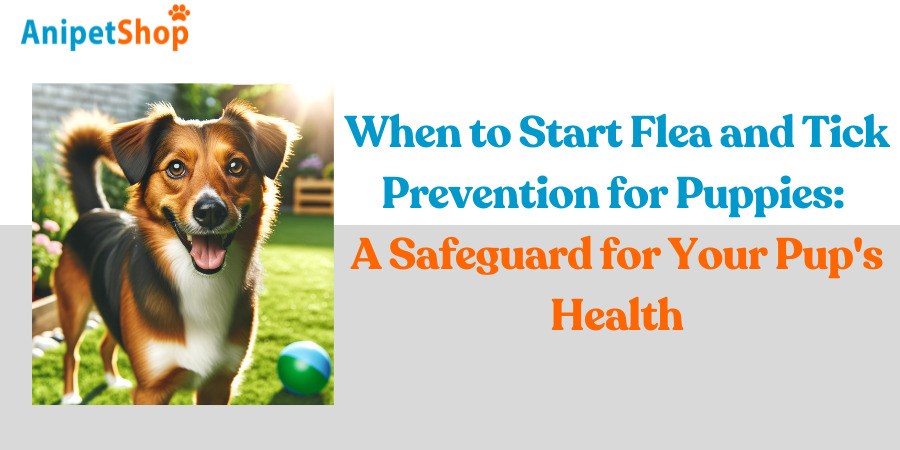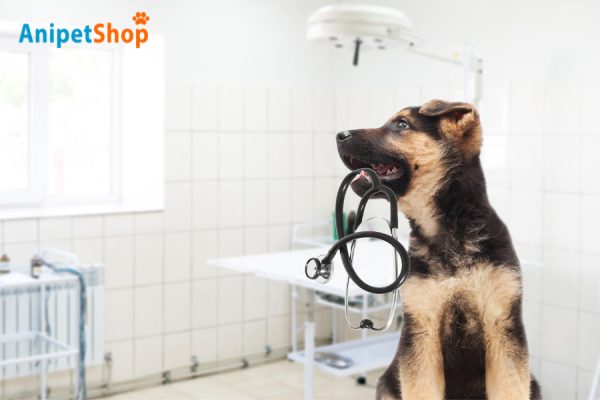When to Start Flea and Tick Prevention for Puppies: A Safeguard for Your Pup’s Health
Puppies are highly vulnerable to fleas and ticks. These minuscule creatures do more than just cause itchiness – they can transmit dangerous diseases. Early preventive care is essential to protect them. This guide will help you uncover why flea and tick prevention matters for puppies, when to start flea and tick prevention for puppies, choosing the right medication, handling puppies younger than 8 weeks, and additional methods to keep them protected. Let’s ensure the health and happiness of your puppy.

Why Flea and Tick Prevention Matters for Puppies
Fleas and ticks pose a range of health risks for puppies, making flea and tick prevention a crucial aspect of their care. Young puppies, particularly those of small breeds, are more susceptible to anemia caused by flea infestations. These pesky parasites can cause significant skin irritation and allergic reactions, leading to incessant itching, discomfort, and even secondary infections. Moreover, fleas can carry tapeworms, which can infect puppies if they accidentally ingest an infested flea during grooming. Tick bites, on the other hand, can transmit dangerous diseases such as Lyme disease and other tick-borne illnesses, which can have severe long-term consequences.

Furthermore, the sheer number of parasites can overwhelm their delicate immune system, making them even more vulnerable to the negative effects of flea and tick infestations. Therefore, deciding when to start flea and tick prevention for puppies and implement preventive measures early is crucial to minimize the risk of heavy infestations and protect your puppy from the potential health complications they can bring. By establishing a proactive approach to flea and tick prevention, you can help your puppy grow into a healthy and thriving companion while ensuring their overall well-being.
When to Start: Age and Product Considerations
You can consult your veterinarian to help determine when to start flea and tick prevention for puppies. They are the best source of guidance tailored to your puppy’s specific needs as they consider factors such as the puppy’s age, breed, overall health, and local parasite prevalence. Additionally, carefully read and follow the instructions on the product labels of flea and tick preventatives. These labels provide important information regarding the age at which the product is safe to use and the proper dosage.
- The majority of flea and tick preventatives available in the market are specifically approved for use in puppies that are 8 weeks of age or older. If you have a puppy that has reached 8 weeks of age or beyond, you can generally find a wide range of suitable flea and tick preventatives to choose from.
- There are certain specialized flea and tick products that have specific dosing instructions for puppies as young as 6 weeks old. These products have been formulated to provide safe and effective protection for younger puppies, but their use requires guidance from a veterinarian.

Choosing the Right Preventive Medication
When choosing flea and tick preventives for your puppy, you first take into account your puppy’s age, size, lifestyle, and the specific parasite risks in your region. There are different types of preventives available:
- Oral medications: These come in chewable or tablet forms and offer comprehensive protection. Some oral medications not only target fleas and ticks but also provide coverage against heartworms, offering a convenient all-in-one solution.
- Topical Treatments: Topical treatments are liquids applied to the skin, typically between the shoulder blades. They vary in their duration of effectiveness, ranging from monthly to several months. These treatments are designed to kill and repel fleas and ticks, providing localized protection.
- Collars: Flea and tick collars are another option. They provide continuous release of medication that helps repel and kill these parasites. However, some dogs or puppies may be sensitive to direct skin contact with the collar, so careful monitoring is necessary.

If you’re searching for flea and tick prevention for your puppies, Anipet Shop is the place to visit. Anipet Shop specializes in offering cost-effective preventive treatments from reputable brands that are endorsed by veterinarians. Having served over 5000 pet parents worldwide, Anipet Shop has earned a trusted reputation as a go-to pet health expert. Its mission is to ensure accessible and affordable pet medications while maintaining the highest level of quality and care.
What if My Puppy is Younger Than 8 Weeks?
If your puppy is younger than 8 weeks old, rest assured that there are still options available to help address fleas and ticks. While preventative medications may not be suitable for very young puppies, you can take the following measures to minimize the impact of these pests:
- Frequent baths with gentle shampoo: Giving your puppy regular baths using a mild, puppy-safe shampoo can help kill existing fleas on their coat. However, it’s important to note that this approach is not a long-term preventative solution.
- Flea comb: Utilize a flea comb specifically designed for puppies to carefully comb through your puppy’s fur. This can help remove fleas and their eggs, reducing their population and providing some relief for your young companion.
- Thorough environmental cleaning: Pay close attention to your puppy’s living environment. Vacuum carpets, upholstery, and bedding regularly to remove any fleas, eggs, or larvae. Washing your puppy’s bedding in hot water can also help eliminate these pests. Additionally, consider using pet-safe flea sprays or powders in your home, following the instructions carefully.

By implementing these measures, you can take proactive steps to manage fleas and ticks even if your puppy is younger than 8 weeks old. Remember to consult Anipet Shop for further guidance and to ensure the safety and well-being of your young pup.
Beyond Medications: Keeping Your Puppy Protected
In addition to using preventive medications, incorporating below these practices into your routine can provide an extra layer of protection for your puppy against fleas and ticks, such as:
- Check your puppy for fleas and ticks after outdoor time: After your puppy spends time outdoors, make it a habit to thoroughly check their fur for any signs of fleas or ticks. Pay close attention to areas such as the ears, armpits, and belly. Promptly removing any parasites you find can help prevent infestations and reduce the risk of disease transmission.
- Avoid areas known for high tick populations (consult with your vet): Consult with your veterinarian to identify areas in your region that are known for having high tick populations. Whenever possible, avoid taking your puppy to these areas or take extra precautions, such as using tick repellents or keeping them on designated paths or trails.
- Keep grass trimmed in the yard, reducing pest habitat: Maintaining a well-trimmed yard can help reduce the habitat for fleas and ticks. Ticks, in particular, thrive in tall grasses and wooded areas. By keeping the grass short, you create an environment that is less favorable for these pests, making your puppy’s outdoor playtime safer.

In conclusion, early and consistent flea and tick prevention is crucial for responsible puppy care. Determining when to start flea and tick prevention for puppies, choosing the right medication with guidance from a veterinarian, and considering alternative methods for puppies younger than 8 weeks old are essential steps. To ensure the best care for your puppy, it’s worth exploring the flea and tick product offerings available on the Anipet website. Take a moment to explore the Anipet website and discover the options available to safeguard your puppy’s health.
Lily Watson is an author specializing in veterinary care in Australia. With a profound passion for animal welfare and a solid foundation in veterinary science, Lily has dedicated herself to disseminating valuable knowledge and information for both pet owners and professionals in this field.

